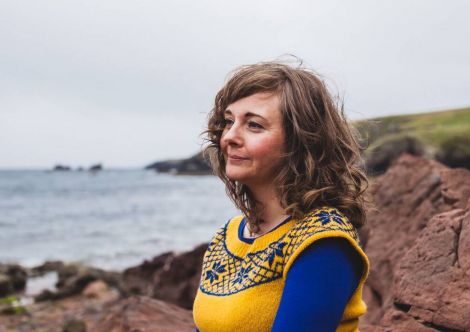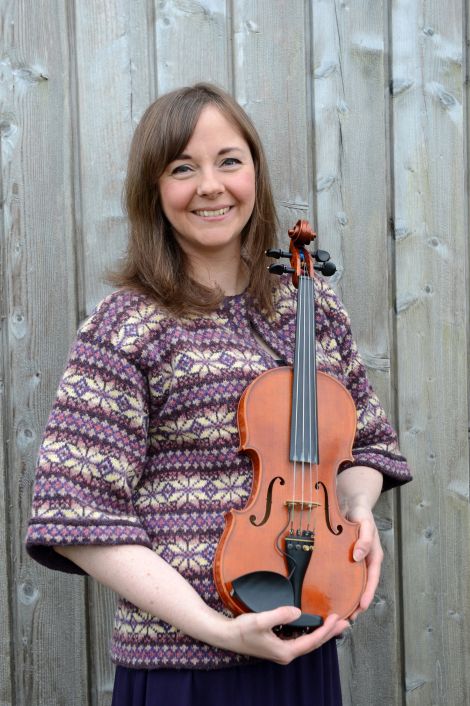Shetland Lives / No place like home for far-travelled White
A SHETLANDER with a far-travelled career in the BBC returned to her native shores this year where she has continued making her mark managing Shetland Food and Drink among numerous other projects.
Claire White will be well-known to knitting fans as the compere of Shetland Wool Week since 2016 (bar last year when she was playing fiddle at a wedding in Italy), but is perhaps less known locally for her media work, as most of her wide-ranging BBC career has been based Sooth.
Claire has brought her characteristic energy to manage Food and Drink and even squeezed in a stint at Radio Shetland when she moved north again. All that plus giving birth to a daughter in June.
Claire’s mother Elizabeth and father Graham, who was an RAF man at Saxa Vord, still stay in Lerwick and her brother Fraser is also in the isles.
She was born 41 years ago in Aberdeen, owing to maternity considerations, and led a very happy childhood in Lerwick, with frequent visits to her grandparents Agnes “Mootie” and Peter Fraser in Aith. She went first to Bell’s Brae and then the Anderson High School.
Claire said: “I had a super education. I loved school. I was one of those folk that just loved everything about it.
“All the activities and opportunities; I led a very full young life, doing drama, fiddle and gymnastics, brownies and all the stuff of the day and ballet.”
The love of education propelled Claire to university at 17. In Aberdeen again, she started “hilariously” studying law, “a memory test”, but quickly switched to geography.
“At that life stage I was keen to do more creative stuff, so Christmas of my first year I thought I fancy doing an MA honours degree instead,” said Claire.
In that spell 1995 to 1999 Claire was working her holidays as a tourist information assistant in Lerwick and also teaching fiddle in various parts of the world and touring with Young Heritage.
Become a member of Shetland News
Her academic excellence led to a masters’ degree at Cambridge University, for which she got an ESRC fellowship.
She added: “It was a bit of a thought to go to Cambridge, I must say. It was not something I ever planned in my life, but up it popped.”
The key to Cambridge was Claire winning the Royal Geographical Society medal for the best graduating student in a class of about 90, and the prize for the best dissertation.
Cambridge, she said, was “an amazing experience” with 20 students and 17 nationalities in the class.
“It was looking at everything from boreholes and wells in Africa up to WTO and IMF negotiations at a global level.”
She was also heavily involved in university social life, involved in the May Ball committee at Darwin College.
“I loved that kind of events-based work and I am still doing it years later.
“I love the idea of folk coming together, working on a project. It’s bit like school days, back to the concerts and fiddle playing.”
Even in the course of her masters Claire was pondering her next step, so she applied to the BBC to do work experience.
This led to a place on Crimewatch. “I went away to Switzerland for a peerie break and literally finished my masters one week and started at the BBC the next in London.”
Children in Need with Terry Wogan and Gary Roslin followed. That millennium year Olympian Steve Redgrave and the boat rowing team took part along with S Club 7 and many other “entertainment greats” of the day.
After that came the inaugural Holocaust Memorial Day in Westminster Central hall, attended by the clergy, Royal family and politicians in January 2001, with the BBC televising the event.
She then worked on a comedy clip series followed by a longer stint with The Flying Gardner with Chris Beardshaw.This involved going to various parts of the UK by helicopter examining stately gardens from above and applying lessons learned from those formal gardens to a domestic setting.
Much though she was in the thick of it with the BBC, Claire was less enamoured with life in the Big Smoke. She said: “I was really keen for as long as I stayed in London to get back to Scotland, for London was not my spiritual home.
“It was just the pace of life, fascinating and exhilarating and great for a peerie start, but I just wanted to get back to better air quality and less traffic and a different pace of life.”
A job as a radio researcher in the relative calm of Aberdeen soon followed, working on documentaries and features for Radio Scotland, Radio 4, World Service and Antrim Radio 2. She became a permanent staff member and worked on various TV documentaries and feature programmes.
She was also seconded to various parts of the UK, and did a stint producing the Radio Café – Radio Scotland’s arts show, and The People’s War, a BBC project to gather living memories of WW2 in Glasgow. She also worked at Radio Leeds as a newsroom team member.
“It was just all things that developed areas of my expertise I felt I was needing to improve on and opportunities that opened up for me, so it was a really varied and interesting career,” said Claire.
“I like organising things and just using core broadcasting skills. I enjoy looking at a chunk of stuff and saying ‘well what story are we telling?’ and marshalling resources to deliver output. That’s something I can do quite intuitively, whether it’s making an album or organising an event or writing something or writing a song or commissioning a film or making a film.”
After returning to radio in Aberdeen numerous times, she went to Glasgow for five years from March 2010 to March 2015, initially as a talent manager, contracting production staff. There, she worked as a producer on documentaries and the 2014 Commonwealth Games before returning to radio in Aberdeen, where she was until May this year.
Then it was time for “big life changes”.
“I got married and moved back to Shetland and became the Taste of Shetland manager, getting to know folk and having the baby on the 21 June, and then running the festival and producing the Shetland Food and Drink guide for 2020,” said Claire.
She commissioned short films about various aspects of Shetland food culture; mackerel fishing and rhubarb champagne and Shetland lamb and wintery picnic faerdie maet.
Of course, fiddling has been another string to her bow. “Music has been a massive part of my life, kind of unintentionally, but it has been absolutely delightful.
“That kind of core repertoire that I learned here in Shetland I have travelled the world sharing and teaching.” With Shetland’s Young Heritage since 1988 Claire visited Australia, New Zealand, the United Arab Emirates, the USA, Canada, Iceland, Norway, Sardinia, Turkey, Italy, Germany, Slovenia, Estonia, Poland, Ireland and the UK.
She taught fiddle privately at university, played in the Cambridge University ceilidh band and performed in sessions and open mics in London at the Cecil Sharp house in Camden.
Claire was a night class instructor in Shetland fiddle in Aberdeen and “had a loyal group that came to all my night classes and learned an awful lot of the repertoire that I know of Shetland tunes.”
Her involvement was not limited to teaching, and she joined the ceilidh bands Danse McCabre and JingBang in 2006.
She formed the duo Blyde Lasses with Frances Wilkins, who spent her formative years in Shetland learning music, and played lots of ceilidhs in Aberdeenshire.
The pair first went oversees in 2010 to Ireland and New Zealand in 2011 and a couple of times to Norway, and Estonia.
With Danse McCabre, Claire has played in Germany and Poland among others and the band plans to go to Belgium next year. And of course there is touring with Hjaltibonhoga.
Claire also somehow managed to cram in curating Fiddle Frenzy in 2016/17.
“That’s been lots of work but always a pleasure and delight. Playing at folk festivals has also been a constant source of friends and fellowship and good funs.”
Maybe oddly, with such a diverse and mobile work and musical history, Claire considers moving back to Shetland as being one of the greatest highlights of her life.
“I know it is a bit of a cliché but I was just driving around this past week now that the Taste of Shetland festival is by with and thinking there is so much going on here. It is a complete delight to be able to immerse myself fully in life here and all that it has to offer.
“It’s such a dynamic place for a peerie population and I am really lucky to be back home and be speaking a language that feels really comfortable for me and not having to knap. You can just be your true self when you are back home.
“I’m just feeling really lucky to be beside my folk, living beside the sea in a beautiful environment.”
The family live in the old buid at Easter Quarff. It was built in 1792 and whaaps, draatsies and selkies are right on the doorstep.
Claire has also been an eager herald for the isles travelling the world and sharing Shetland’s story. “That has been a theme that has run right through my life. Wherever you go there’s a Shetland connection, a spark of recognition, there’s a conversation. You usually learn things about where you’re from you can follow up.
“Songwriting is a big part of what I do. I took out an album this time last year based on various aspects of Shetland’s history with a focus on women’s story and I suppose that’s the stuff I’ve gathered over many years as I’ve been on my travels playing music all over the world. That’s been such a rich, life affirming thing to take on and be part of.”
According to Claire, Wool Week has been an astounding success story that could provide a template for the development of other sectors. “I think that there are so many aspects of Shetland culture that could be similarly shared world-wide. Up Helly Aa is already. Our language, our food, all these things are just ripe for development.
“We have had a very strong economy for the last 40 years and the more we can diversify, I suppose the healthier it is for everybody, socially and culturally, and it is just a stronger economic basis for any island group, to try and fully develop any opportunities that are open to you.
“Doing my job, I do think that there are loads of food opportunities that are ripe for making the most of. It just needs the warm bodies about the place and the energy and enthusiasm and the wherewithal to make it happen. We have unsurpassed natural resources here and it is just a matter of bringing them to market.
“Everybody would acknowledge that the [wool] industry as a whole is much better for all that marketing might that has gone behind that event, and Shetland is the better for it, generally.
“Everything works symbiotically here and there’s a case for saying support everything, support everything indigenous. There’s all sorts of partnerships and relationships develop by supporting everything.
“Let’s concentrate on the positive and run with it.
“I always say that Shetland is a place that gives back. Whatever you put into Shetland it will come back at you one way or another, multiplied and enhanced.
“I always speak about the community life here and it always is the basis, the bedrock for everything that happens and all the businesses that arise from that. It is all depending on that very strong networked community life.
“The digital revolution has created pipelines for getting all that good stuff out of here really easily.
“And we have a really treasured quality profile internationally. We have got a strong brand that has been cultivated carefully over lots of years. We have got community assets, social capital, and that’s a really powerful combination.
“If we create good opportunities for one another, if we support one another, if we are positive about enterprise of all sorts and community life then that begets more of same.”
On midsummer day, Claire and Michael’s daughter was born, weighing just two pounds and seven ounces.
Claire said: “We have been on a long road to get up to almost 11 pounds. We were nearly seven weeks in the neo-natal unit in Aberdeen – I cannot speak highly enough of that place – then we came home.
“It was an untypical pregnancy and the whole time through we weren’t really sure where we were going with it, if it was going to work out for wis.”
Claire took two months off work and then “cracked at” again.
Solfrid was named in recognition of the solstice and of the fact the couple are “huge Scandinavian fans”.
“It is a 19th century Norwegian name which translates literally as ‘sun beautiful’, so that is why it was chosen and we have a friend called Solfrid, so we were delighted to name her after her.
“We keep up many links [with Scandinavia] and feel very close to Scandinavia culturally, so it felt very lovely to give our peerie lass a Norwegian name.”
Become a member of Shetland News
Shetland News is asking its many readers to consider paying for membership to get additional features and services: -
- Remove non-local ads;
- Bookmark posts to read later;
- Exclusive curated weekly newsletter;
- Hide membership messages;
- Comments open for discussion.
If you appreciate what we do and feel strongly about impartial local journalism, then please become a member of Shetland News by either making a single payment, or setting up a monthly, quarterly or yearly subscription.

































































